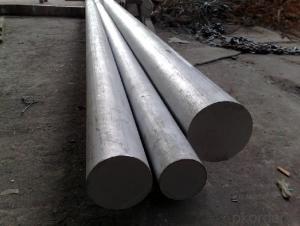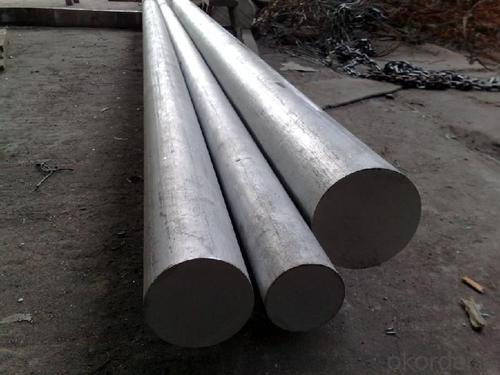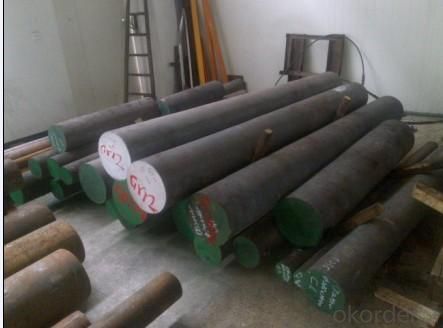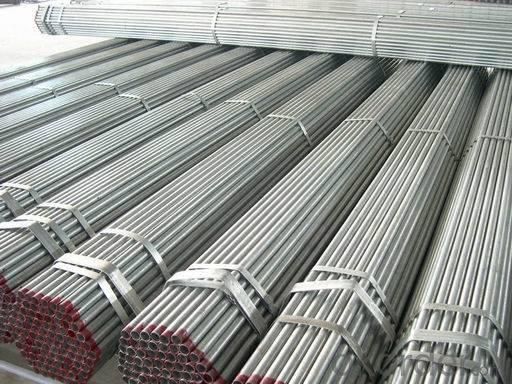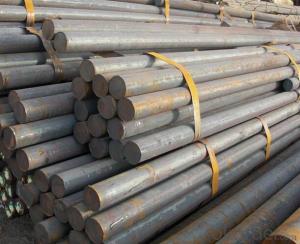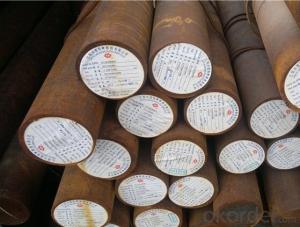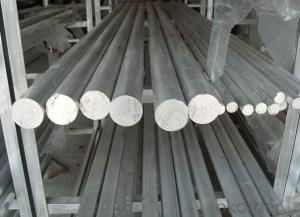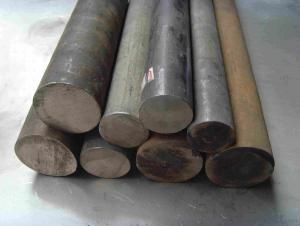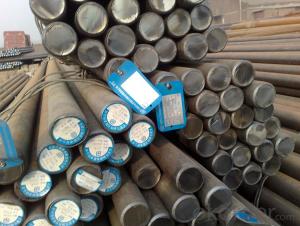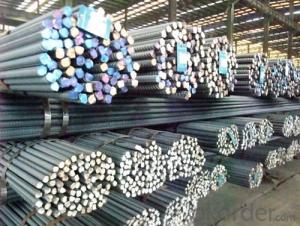Alloy Tool Steel 1.2510/o1/9CrWMn Special Steel
- Loading Port:
- China main port
- Payment Terms:
- TT OR LC
- Min Order Qty:
- 30 m.t.
- Supply Capability:
- 10000 m.t./month
OKorder Service Pledge
OKorder Financial Service
You Might Also Like
Specification
Alloy Tool Steel 1.2510/o1/9CrWMn Special Steel
Product Information:
1.Size:
Flat: 12-120*205-610mm*2000-5000mm
Rould:16-150*2000-5000mm
2. Delivery condition:
Hot rolled or foged,annealed ,EAF or ESR,black or milled surfaceSoften annealed: ≤ 255HB
3.Application:
Cold work die steel Widely applied in fabrication of blanking die, punching die, bending die and bernishing die with the thickness of not more than 8mm.
Also widely applied in fabrication of gauges, measuring tools, woodwork cutters and lathe thimble, etc;
Also widely applied in fabrication of guiding bush, thimble, screwing dies and taps, etc.
4.Feature:
Vacuum refining, with pure steel quality
Spheroidal annealing to soften the tissue for easy cutting and processing
Very high hardness in case of quenching
Very good size stability aftertempering
Product Overviews:
| Product Name | Typical Grades | Diameter(mm) | Standard adopted |
| Carbon Steel | 20 (1020/S20C/C22) | Ø16-Ø300 | GB/SAE/JIS/DIN |
| 40 (1040/S40C/C40) | |||
| 45 (1045/S45C/C45) | |||
| Bearing Steel | GCr9 (51100/SUJ1) | Ø12-Ø250 | |
| GCr15 (52100/SUJ2/100Gr6) | |||
| GCr9SiMn (A485-Gr.1/SUJ3) | |||
| Cr-Mo Steel | 20Cr (5120/SCr420H/20Cr4) | Ø12-Ø250 | |
| 40Cr (5140/SCr440/41Cr4) | |||
| 42CrMo(4140/SCM440/42CrMo4) | |||
| Gear Steel | 20CrNiMo | Ø16-Ø600 | |
| 20CrMn(5115/SMnC420/20MnCr5) | |||
| 20CrNiMo(8620/SNCM220/20CrMiMo2) |
Product Show:

Our Advantages:
· Industry experience over 20 years.
· Shipment of goods -More than 70 countries worldwide.
· The most convenient transport and prompt delivery.
· Competitive price with best service.
· High technical production line with top quality products.
· High reputation based on best quality products.
With our experienced, enthusiastic and dynamic staffs, we assure to bring you the products with best quality, reasonable prices and good after-sales services under the motto: Friends First, Business After.
Communication, Experience, Expertise and Best efforts are our Promises to you.
- Q: How does special steel perform in extreme weather conditions?
- Special steel is specifically designed to perform well in extreme weather conditions. It has high resistance to corrosion, making it suitable for use in harsh environments, such as extreme cold or hot temperatures, high humidity, or exposure to saltwater. Special steel also has excellent strength and toughness, enabling it to withstand heavy loads, impact, and vibrations. Overall, special steel exhibits superior performance and durability in extreme weather conditions, making it an ideal choice for various applications, including construction, marine, and aerospace industries.
- Q: How does special steel contribute to the energy equipment industry?
- Special steel plays a crucial role in the energy equipment industry by providing materials with superior strength, durability, and corrosion resistance. These properties enable the production of high-performance components such as turbine blades, pressure vessels, and pipelines, which are essential for power generation, transmission, and distribution. Additionally, special steel's ability to withstand extreme temperatures and harsh operating conditions enhances the efficiency and reliability of energy equipment, ultimately contributing to the overall sustainability and advancement of the industry.
- Q: What are the challenges in forming special steel?
- Forming special steel poses several challenges due to its unique characteristics and properties. Some of the main challenges include: 1. High melting point: Special steels often have high melting points, which require specialized equipment and processes to heat and form the material. This can lead to increased energy consumption and cost. 2. Alloy composition: Special steels are typically alloyed with various elements to enhance their properties, such as strength, hardness, and corrosion resistance. However, the precise control of alloy composition can be challenging, as minor variations can significantly affect the material's properties. 3. High carbon content: Certain special steels, such as tool steels, contain high carbon content to enhance hardness and wear resistance. However, this high carbon content makes the material more prone to cracking during forming processes like forging or rolling. Special care must be taken to prevent these cracks and ensure the desired shape is achieved. 4. Heat treatment requirements: Special steels often require specific heat treatment processes, such as quenching and tempering, to achieve the desired mechanical properties. These processes can be complex and require precise control of temperature, time, and cooling rates. Failure to properly carry out heat treatment can result in poor material performance or even structural failure. 5. Surface finish and dimensional accuracy: Special steels are often used in applications where surface finish and dimensional accuracy are critical, such as in the aerospace or automotive industry. Achieving the required surface finish and dimensional accuracy during forming operations can be challenging, requiring advanced tooling and precision machining techniques. 6. Specialized equipment and expertise: Special steels may require specialized equipment and expertise to form, such as high-pressure hydraulic presses, induction heating equipment, or vacuum furnaces. These specialized tools and processes add complexities and costs to the manufacturing process. Despite these challenges, forming special steels is essential in various industries where their unique properties are required. Manufacturers continuously invest in research and development to overcome these challenges and improve the forming processes of special steels.
- Q: What are the different types of tool steel?
- There are several different types of tool steel, including high-speed steel, cold work steel, hot work steel, and plastic mold steel. Each type of tool steel is specifically designed for different applications and has unique properties that make it suitable for specific tasks.
- Q: How does special steel perform in electrical applications?
- Special steel, known as electrical steel, is purposely created and produced to meet the specific needs of electrical applications. It displays outstanding magnetic properties, rendering it highly suitable for utilization in electrical machines and devices. A primary feature of special steel is its diminished electrical resistivity, enabling efficient current flow and minimizing energy losses in electrical circuits. This reduced resistivity is achieved through precise control of the steel's composition and microstructure. Moreover, special steel possesses a high magnetic permeability, allowing for easy magnetization and demagnetization. This characteristic is crucial for the effective functioning of electrical machines such as transformers, motors, and generators. Additionally, special steel exhibits low coercivity, making it susceptible to magnetization or demagnetization with relatively low levels of magnetic field strength. This attribute proves advantageous in applications requiring rapid and precise magnetic switching, like electric transformers. Furthermore, special steel demonstrates minimal hysteresis loss, which pertains to the dissipation of energy as heat during magnetization and demagnetization cycles. This quality guarantees minimal energy losses in electrical devices, ultimately improving overall efficiency. To summarize, special steel excels in electrical applications due to its low electrical resistivity, high magnetic permeability, low coercivity, and low hysteresis loss. These properties establish it as an ideal choice for a wide range of electrical machines and devices, enhancing their efficiency and reliability.
- Q: What are the different heat treatment defects in special steel?
- During the heat treatment process of special steel, various defects can occur. Some of the most frequently encountered defects are as follows: 1. Decarburization: This defect arises when the steel's outer layers lose carbon due to exposure to high temperatures in an environment rich in oxygen. The consequence of decarburization is reduced hardness and strength in the treated steel. 2. Quench cracking: Also known as cracking during quenching, this defect emerges when the steel undergoes rapid cooling subsequent to heating. The differential cooling rates can induce internal stresses, resulting in cracks within the material. 3. Distortion: Distortion refers to alterations in the shape or dimensions of the steel during the heat treatment process. It can be caused by uneven heating or cooling, inadequate fixturing, or improper quenching techniques. 4. Soft spots: Soft spots are localized areas of reduced hardness in the treated steel. These spots can occur due to insufficient heating or improper quenching, leading to diminished mechanical strength in those regions. 5. Overheating: Overheating is a defect that occurs when the steel is subjected to excessively high temperatures during the heat treatment process. This can lead to grain growth, reduced toughness, and overall decreased material properties. 6. Case hardening problems: Special steels often undergo case hardening processes, such as carburizing or nitriding, to create a hardened outer layer. However, several defects can arise during these processes, including inadequate or excessive hardening, poor case depth, or uneven distribution of hardness. 7. Residual stresses: Residual stresses are internal stresses that persist in the steel after the heat treatment process. If not properly controlled, these stresses can cause dimensional instability, warping, or even cracking. To prevent or minimize these heat treatment defects, it is crucial to adhere to proper heat treatment procedures. This includes precise temperature control, appropriate cooling rates, and suitable fixturing techniques. Furthermore, the use of high-quality heat treatment equipment, close monitoring of the process, and thorough inspections can aid in detecting and rectifying any potential defects in special steel.
- Q: What are the different corrosion-resistant coatings for special steel?
- Various corrosion-resistant coatings are available for special steel, each possessing unique properties and advantages. Some commonly used coatings include: 1. Zinc Coating: Galvanizing and other zinc coatings are widely employed to safeguard special steel against corrosion. The zinc layer acts as a sacrificial barrier, preventing corrosive elements from coming into contact with the steel. 2. Epoxy Coating: Due to their exceptional adhesion, chemical resistance, and durability, epoxy coatings are a popular choice for corrosion protection. They create a robust barrier that shields special steel from moisture, chemicals, and other corrosive agents. 3. Polyurethane Coating: In harsh environments where special steel is exposed to extreme conditions, such as offshore or marine applications, polyurethane coatings offer exceptional resistance against abrasion, chemicals, and weathering. 4. Ceramic Coating: Ceramic coatings provide outstanding corrosion protection and high-temperature resistance. They are frequently used in industries like aerospace and automotive, where special steel must withstand extreme temperatures and corrosive environments. 5. Metal Coating: Nickel or chromium coatings are frequently applied to special steel to enhance its corrosion resistance. These coatings establish a protective layer that acts as a physical barrier, preventing corrosion. 6. Powder Coating: Powder coatings are electrostatically applied and then cured under heat, resulting in a hard and durable protective layer. They offer excellent corrosion resistance and can be customized in terms of color and texture. Choosing the appropriate corrosion-resistant coating for special steel is crucial and should be based on specific requirements and the environment it will be exposed to. Factors such as temperature, exposure to chemicals or moisture, and desired coating lifespan should all be considered when selecting the suitable coating.
- Q: How does special steel perform in high-temperature creep conditions?
- Special steel is specifically designed and engineered to perform exceptionally well in high-temperature creep conditions. It exhibits remarkable resistance to deformation and maintains its mechanical properties even at elevated temperatures, making it highly reliable and suitable for applications that require stability and strength in such environments.
- Q: What are the requirements for special steel used in energy equipment manufacturing?
- Special steel used in the manufacturing of energy equipment must meet stringent and specific requirements. These steels need to possess certain characteristics that make them suitable for handling the extreme conditions and demands of energy equipment. To begin with, high strength is a crucial requirement for special steel used in energy equipment manufacturing. These steels must have excellent mechanical properties, such as high tensile strength and good toughness. This is necessary to withstand the heavy loads, pressure, and stresses experienced by energy equipment like turbines, generators, and power transmission systems. Additionally, special steels used in energy equipment manufacturing must demonstrate exceptional heat resistance. They must maintain their structural integrity and mechanical properties even at elevated temperatures. This is especially important for components like boiler tubes and heat exchangers, as energy equipment operates under high-temperature conditions. Heat-resistant steels with high melting points and low thermal expansion are therefore essential. Corrosion resistance is another vital requirement for special steel used in energy equipment manufacturing. Energy equipment is often exposed to harsh environments, including corrosive gases, fluids, and high humidity. Therefore, the special steels used should have excellent resistance to corrosion, oxidation, and erosion. This ensures the longevity and reliability of the energy equipment, reducing maintenance and replacement costs. Moreover, special steels used in energy equipment manufacturing should possess good weldability and machinability. Energy equipment often requires complex fabrication processes and weldments. Therefore, these steels should have good weldability to ensure easy and reliable joining. Similarly, machinability is crucial for the production of energy equipment components, as it allows for efficient shaping and finishing. Lastly, special steel used in energy equipment manufacturing must meet strict quality and safety standards. They should adhere to international codes and regulations, such as those established by organizations like the American Society of Mechanical Engineers (ASME) and the International Electrotechnical Commission (IEC). These standards guarantee that the special steels meet the necessary specifications and performance requirements for energy equipment, promoting safety and reliability. In conclusion, the requirements for special steel used in energy equipment manufacturing encompass high strength, heat resistance, corrosion resistance, weldability, machinability, and compliance with quality and safety standards. By meeting these requirements, the special steels can withstand the extreme conditions and demands of energy equipment, ensuring their longevity, reliability, and safety.
- Q: What are the different methods for tempering special steel?
- There are several different methods for tempering special steel, including air tempering, oil tempering, water tempering, and salt bath tempering. Air tempering involves heating the steel to a specific temperature and then allowing it to cool in air. Oil tempering involves heating the steel to a specific temperature and then quenching it in oil. Water tempering is a similar process, but the steel is quenched in water instead. Salt bath tempering involves heating the steel in a molten salt bath to achieve the desired tempering temperature. Each method has its own advantages and is chosen based on the specific properties and requirements of the steel being tempered.
Send your message to us
Alloy Tool Steel 1.2510/o1/9CrWMn Special Steel
- Loading Port:
- China main port
- Payment Terms:
- TT OR LC
- Min Order Qty:
- 30 m.t.
- Supply Capability:
- 10000 m.t./month
OKorder Service Pledge
OKorder Financial Service
Similar products
Hot products
Hot Searches
Related keywords
